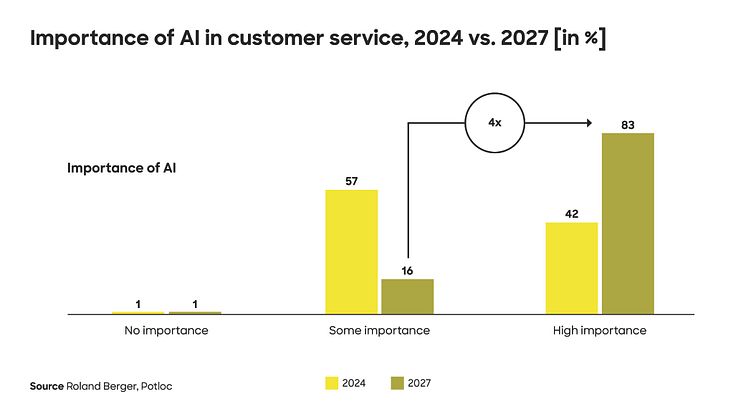
Press release -
Roland Berger study: AI is dramatically changing ways of working and job profiles in customer service
- 95% of executives surveyed already use AI in customer service processes; 83% expect developments to accelerate rapidly in the coming years
- Job profiles in customer service and call centers will change on a massive scale in Germany alone
- Asian companies have a growing lead; in Europe, regulatory constraints slow down progress
Munich, May 2025: Customer service is another of the many areas seeing increasing deployment of artificial intelligence (AI), according to a new study by Roland Berger. In a survey of more than 550 customer service leaders from companies across various industries and regions, they found that 95% of respondents are already using AI in certain processes. Customer service executives also see developments accelerating rapidly: Although only 42% currently rate the technology as very important, twice as many (83%) expect AI to become very important in their work over the next three years. This will change the profile of around half a million jobs in customer service and call centers in Germany alone: On the one hand, there is a growing need for employees with the higher skill levels and technical competency needed to understand AI and control it, and on the other hand, low-skilled jobs will be removed and their job profile will also continue to diminish as AI takes over some of the work. Companies in Asia especially, but also some in the United States, are already much further ahead in the deployment of AI in customer service than their European counterparts. To remain competitive, companies should develop a holistic strategy for implementing AI in customer service. This includes having clearly defined goals, job profiles and upskilling opportunities as well as revising organizational structures and processes.
"The biggest challenge in customer service is to meet customers' expectations and thus ensure the best possible customer engagement," says Steffen Thiel, Partner at Roland Berger. "Even though humans will continue to play an important role in this process, AI can provide very effective support, from communication – such as with real-time translation, speech routing and chatbots – to automating routine processes or summarizing calls. In Asia especially, use cases in customer service go much further, with AI already being used for things like sentiment analysis, personalized recommendations and active selling."
The study authors identified three levels of AI maturity in customer service. At level one, companies have the standard customer service offering with some automated processes; level two transformers are already operating with a wide range of automated and outsourced processes and an optimized, value-driven customer experience. At level three are AI champions, organizations where AI handles customer service with minimal human intervention and offers a personalized customer experience and 24/7 full-service availability. These are the organizations with the greatest potential for using AI to create a cost/benefit-optimized operating model.
Many companies are still in the early stages of deploying AI in customer service
What the survey also shows, however, is that most customer service organizations still display a low to medium level of AI readiness: Across all industries, 60% of respondents can be classified as "laggards", 33% as "adopters" and only 7% as "AI innovators". The biggest proportion of adopters and innovators (47% in total) is found in the wholesale and retail industry – a sector with a strong history of implementing customer engagement solutions. Almost no innovators at all are found in the consumer goods sector. Overall, these findings indicate that many organizations are still in the early stages of implementing AI in customer service.
"In Europe especially, many companies are lagging behind competitors in Asia and also the US, who are pulling ever further ahead," says Simone Schatto, Director at Roland Berger, and recommends taking a holistic approach: "It is not enough to just convert individual customer service processes to AI and deal with interface problems later. What organizations need to do is develop a holistic concept and a strategy for AI-assisted customer service." This includes defining clear goals, revising internal structures and processes with the goals in mind, adjusting job profiles and upskilling existing employees through training programs. Technical enablers such as access to high-quality data, coherent data structures, and the right tools and technology also need to be considered from a holistic perspective.
Companies should help shape the framework for AI deployment
Another key reason why Europe lags behind lies in regulatory requirements and the established structures within companies, which make it more difficult for businesses to deploy AI. Here too, Schatto recommends taking an active role: "Companies should not be deterred by legislative restrictions but should discuss possible use cases with technology providers in very concrete terms and put the necessary requirements in place within the business to enable them. Only through cooperation can they shape the framework that will allow AI to be deployed to its full potential in customer service and its many advantages to be felt by customers and business alike."
Topics
Categories
Roland Berger is one of the world's leading strategy consultancies with a wide-ranging service portfolio for all relevant industries and business functions. Founded in 1967, Roland Berger is headquartered in Munich. Renowned for its expertise in transformation, innovation across all industries and performance improvement, the consultancy has set itself the goal of embedding sustainability in all its projects. Roland Berger generated revenues of around 1 billion euros in 2024.



